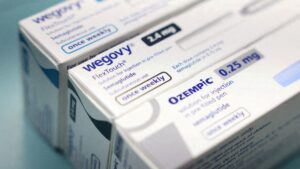A New Era in Weight Loss and Diabetes Treatment: Novo Nordisk’s Supply Shortage Resolved
In a significant development for both patients and investors, the U.S. Food and Drug Administration (FDA) has announced the resolution of a long-running shortage of Novo Nordisk’s highly sought-after medications, Ozempic and Wegovy. These drugs are best known for their use in managing diabetes and aiding weight loss. This decision, announced on a recent Friday, marks the end of over two years of uncertainty that has left many patients scrambling for alternatives.
The Impact of the FDA’s Decision
Novo Nordisk’s stock closed approximately 5% higher following the news, which is a reflection of both investor confidence and the potential for increased sales with an uninterrupted supply chain. In stark contrast, shares of Hims & Hers, a telehealth service that has been offering compounded versions of these medications, plummeted more than 25% as the market braced for a reduction in demand for their unapproved products.
The active ingredient in Ozempic and Wegovy, semaglutide, had been in high demand since 2022, prompting Novo Nordisk to ramp up its manufacturing capabilities. According to the FDA, Novo Nordisk has now met the current and anticipated demand for semaglutide injections in the U.S. Nevertheless, patients may still experience “intermittent and limited localized supply disruptions” as the products transition through the supply chain.
A Warning Against Unapproved Alternatives
Dave Moore, Novo Nordisk’s executive vice president of U.S. operations, emphasized the importance of using FDA-approved medications. “No one should compromise their health due to misinformation and reach for fake or illegitimate knockoff drugs that pose significant safety risks to patients.” This sentiment is especially poignant as many patients previously relied on compounded versions of the drugs, often created at lower costs by pharmacies in response to the shortage.
Compounded Medications Face New Challenges
As part of the FDA’s ruling, compounding pharmacies have 60 to 90 days to cease production of unapproved versions of semaglutide. However, these pharmacies may still provide modified doses or alternative formulations tailored to a patient’s specific needs. This transition gives patients some leeway to switch back to the branded versions, though many face significant out-of-pocket costs. Wegovy, for instance, can cost around $1,000 a month, and while Ozempic is often covered by health insurance, weight-loss medication is typically excluded from Medicare coverage.
The Broader Market Landscape
The FDA’s resolution may also position Novo Nordisk favorably against competitors like Eli Lilly, whose tirzepatide injectables for weight loss and diabetes management have gained traction in the marketplace. With analysts estimating that the weight loss drug market could surpass $150 billion annually by 2030, Novo Nordisk’s ability to effectively meet demand could be a game-changer.
Final Thoughts
For health-conscious investors and patients alike, this FDA announcement is twofold in its significance. For investors, it reflects a stabilizing force in a volatile market, while for patients, it hopefully translates to greater access to effective treatments. At Extreme Investor Network, we recognize the importance of staying informed about these developments, particularly as they can directly impact financial health and public well-being. As always, keeping an eye on evolving market dynamics can help our readers make empowered investment choices.
For further insights and updates on the latest business trends, market developments, and health-related news, keep exploring our resources at Extreme Investor Network. Your next investment breakthrough could be just a click away!
Feel free to reach out for additional information or insights specific to your investment interests!

